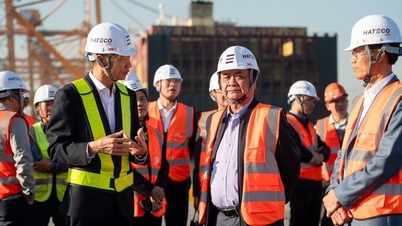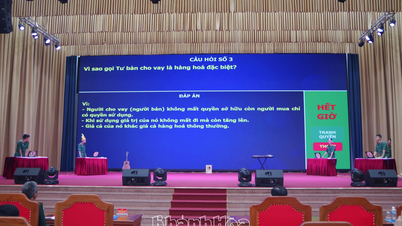Entrepreneur - “innovator”, “practical institution builder”
- In your opinion, in the new development stage of the country, what strategic role does the business community play?
- In the new development stage, the role of Vietnamese entrepreneurs has gone beyond the framework of “investors” and “managers”, but has gradually taken shape as “innovators” and “practical institutional creators”. When Resolution 57-NQ/TW identified science, technology, innovation and digital transformation as strategic breakthroughs, entrepreneurs became the ones who directly turned technology into productivity, data into knowledge, and knowledge into economic value.

They are also an important bridge in the process of international integration. In the context of the continuous expansion of new-generation trade agreements, entrepreneurs are the ones who bring Vietnamese brands into the global value chain - not only through products, but also through standards, ethics and competitiveness. They are the "national brand positioners" in the globalized economy.
In addition, entrepreneurs are also the core of local development. As the country moves towards a regional development model, the role of private enterprises becomes more evident: they connect local resources - capital, technology, labor to form industry clusters, value chains and create sustainable livelihoods. This is a way of inclusive development, not only enriching one enterprise, but also creating momentum for the whole community.
And most importantly, entrepreneurs of the new era must combine growth with social responsibility. A business is only truly “big” when its economic value goes hand in hand with ethical values - respect for people, compliance with the law, transparency and sustainability. That is not only a measure of corporate culture but also the foundation of national prestige in the era of globalization.
- As you just mentioned, Resolution 57-NQ/TW will support entrepreneurs to become the ones who directly turn technology into productivity and economic value. In the process of applying technology, innovation, and digital transformation, in your opinion, what difficulties do businesses encounter?
- It can be seen that digital transformation is creating a comprehensive restructuring in the Vietnamese business world - from leadership thinking to business models and value creation methods. What I observe most clearly is the change in productivity and decision-making capacity. As data becomes a “strategic asset”, digital management systems help them monitor performance in real time, predict risks and make decisions faster.
Regarding the biggest challenge, I think it is not the technology, but the development mindset and strategic approach. Many businesses still consider digital transformation as “buying technology” instead of a comprehensive restructuring of the business model, organization and operating culture. When the mindset has not changed, any digital investment is likely to fall into a state: strong in technical implementation, but weak in vision and governance.
Another barrier is resources and data. Most Vietnamese businesses, especially small and medium-sized enterprises, lack all three pillars: capital investment in technology, human resources with digital skills, and standardized data systems. Many businesses still operate with fragmented data and lack a connection platform, which limits the application of AI, Big Data, and analytical models. Digital infrastructure in some localities is still weak, while the legal framework on data, cybersecurity, and digital assets is still being completed.
- What is the solution to this problem, sir?
- To truly transform digitally, first of all , Vietnamese businesses need to Shifting leadership thinking - from experience-based management to practice-based decision-making through a technology lens. Leaders must understand technology, see long-term value and align digital transformation with business strategy, not consider it a short-term project.
Second , invest in targeted and measurable results. Digital transformation is not about doing everything, but choosing the right “breakthrough” point - where technology creates the greatest value for customers and internal performance. Every dollar spent on technology must be linked to clear metrics such as ROI, productivity, customer experience, etc.
Third, build a digital culture from within. Every change starts with people. Businesses must create an environment where employees can learn, try and make mistakes within limits - only then will the spirit of innovation become "organizational DNA".
Fourth, data must be seen as the knowledge infrastructure of the enterprise. Every innovation, automation or AI application starts with data quality. Enterprises need to standardize, connect and exploit data strategically - so that every decision is built on a foundation of understanding, not emotion.
And finally, cooperation is needed to go faster. Enterprises need to join hands with technology corporations, banks, research institutes, etc. to share platforms, knowledge and finance.
In short, change your mindset - choose your focus - build your culture - master your data - collaborate to break through. These are five things businesses must do if they want to stand firm in the digital economy.
Shift from “preferential” to “capacity building” mindset
- In the context of deep international integration, what should Vietnamese enterprises do to improve their competitiveness and better utilize new-generation trade agreements?
- Vietnamese enterprises need to shift from the mindset of “enjoying incentives” to “building capacity”. Integration is not only about opening the market but also about meeting international standards on production, management and compliance.
Meanwhile, the advantage of cheap labor is no longer the key. Trade agreements (FTAs) require businesses to invest in clean technology, renewable energy and emission reduction - essential conditions to access large markets such as the EU and North America. Carbon border adjustment mechanisms (CBAM) will be a significant non-tariff barrier, only businesses with transparent supply chains can survive.
In addition, digital transformation is key to increasing productivity and responsiveness. Businesses need to digitize comprehensively, leveraging data and artificial intelligence to analyze the market, forecast demand and optimize management.
Finally, businesses need to proactively participate in policy creation, not just be affected. Deep understanding of FTA commitments and feedback through associations helps make policies more practical, reducing compliance costs and implementation time.
After a series of strategic resolutions were issued by the Politburo , what I expect is that the upcoming policies will be more strongly concretized, with a focus on putting businesses and entrepreneurs at the center of the development process. When policies are clear, the environment is transparent and the business community maintains a spirit of integrity and creativity, the private economic sector will become a real engine of growth, contributing to bringing Vietnam forward faster in the era of global integration.
Thank you!
Source: https://daibieunhandan.vn/doanh-nhan-thoi-dai-moi-phai-gan-tang-truong-voi-trach-nhiem-xa-hoi-10390114.html


















































































































Comment (0)